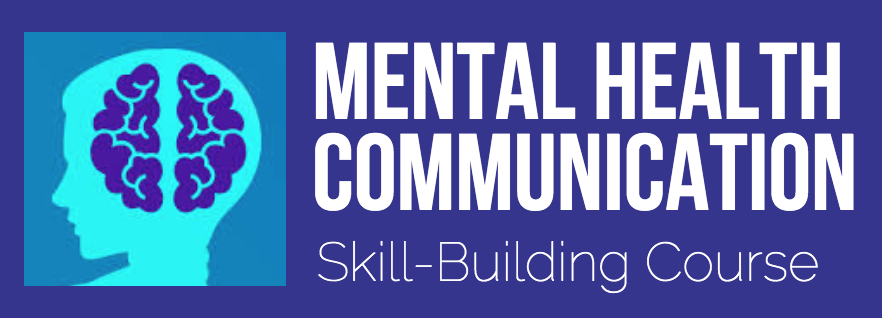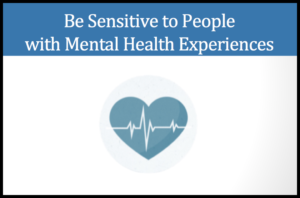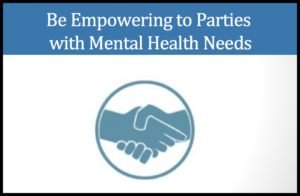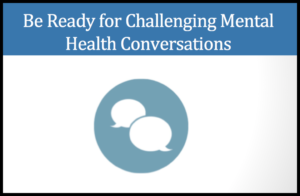
The Become an Effective Mental Health Communicator course teaches ways to be sensitive, impartial, and accessible to parties with mental health concerns. An overview of the 3 modules and some testimonials are presented below.
Program Overview

A: Be Sensitive to People With Mental Health Experiences (60 min)
Understand the definitions of mental health and mental illness, the prevalence of mental health problems, and the best language to use when discussing mental health conditions. Appreciate the choices, perspectives, and experiences of people living with mental health conditions, supporters, and mental health professionals. Receive tools and guidance of ways to be sensitive across the diverse viewpoints in mental health.
Takeaway Tool: Sensitivity Checklist
Past trainees say…
- “My eyes are opened to the scope of diversity of experiences”
- “This is beautifully designed. It is really helpful to have all the aspects you talk about so well defined.”
- “This includes a first person narrative that makes all the materials very accessible”
- “This gives a deeper insight to what a person with mental illness goes through and a deeper respect for them.
- “I have already recommended it to several people. I told them it was extremely informative and valuable.
- “I believe the values and themes are also applicable to communicating with any ‘other’ – not just people with mental illness.”

B: Be Empowering to People With Mental Health Needs (60 min)
Learn tools from the world of conflict resolution to help you be empowering when communicating with people with mental health needs. Skills include reflective listening, validating diverse perspectives, demonstrating fairness, communicating transparently, and trauma-informed practices.
Takeaway Tool: Tipsheet for Empowered Practices
Past trainees say…
- “Just want to say that the real world examples are extremely helpful in learning these concepts.”
- “I’m going to apply these skills in my work”
- “This module provides a written tipsheet which you can always reference and utilize on how to empower parties with mental health needs (i.e. developing processes to make them feel safe, communicating).”
- I will be using the tipsheet as a touchstone to remind myself of all these important points. It is helpful to re read it (perhaps daily) to connect to the mission of empathetic and supporting communication.”
- “I have learned skills in this module that help me approach people better.”

C: Be Ready for Challenging Mental Health Conversations (60 min)
Apply the lessons from the previous modules to preparing for difficult conversations about mental health. Learn strategies for conversations about labels, treatment, sensitivities, lifestyle choices, and trauma. Receive a template you can use for future conversations.
Takeaway Tool: Challenging Conversations Template
Past trainees say…
- “The Challenging Conversations Template will help to ensure you are prepared and keep you on track.”
- “It helped me develop a deeper understanding of labels and trauma, what questions to ask or avoid and how to prepare for these types of conversations.”
- “The de-escalation segment was extremely useful, prior to these modules I didn’t possess the skills to effectively de-escalate a situation”
- “I think the section on metrics for success was particularly useful.”
- “I learned to be prepared ahead before going into a difficult conversation”
- “I will definitely utilize the skills and knowledge obtained from this training. Thank you!”
About Dan Berstein, Presenter
 Dan Berstein is a mediator living with bipolar disorder and the founder of MH Mediate, an innovative company at the forefront of mental health communication and conflict resolution. Dan has been an awareness speaker for the National Alliance on Mental Illness, a support group facilitator for the Depression and Bipolar Support Alliance, a Mental Health First Aid instructor for the NYC Department of Health and Mental Hygiene, and a mediator for the New York Peace Institute. He holds a master’s degree in Mental Health and certificate in Health Communication from the Johns Hopkins School of Public Health, where he launched a Mental Health Conflict Resolution Training Project as part of the university’s Social Innovation Lab.
Dan Berstein is a mediator living with bipolar disorder and the founder of MH Mediate, an innovative company at the forefront of mental health communication and conflict resolution. Dan has been an awareness speaker for the National Alliance on Mental Illness, a support group facilitator for the Depression and Bipolar Support Alliance, a Mental Health First Aid instructor for the NYC Department of Health and Mental Hygiene, and a mediator for the New York Peace Institute. He holds a master’s degree in Mental Health and certificate in Health Communication from the Johns Hopkins School of Public Health, where he launched a Mental Health Conflict Resolution Training Project as part of the university’s Social Innovation Lab.
Dan convened the first independently-organized National Dialogue on Mental Health event in response to Barack Obama’s call for community conversations on mental health. It was the first to be inclusive toward diverse stakeholder groups and became a model for future organizers throughout the nation. Through MH Mediate, Dan has provided mental health communication trainings in over a dozen states to clients including mental health service providers, legal agencies, universities, conflict resolution centers, and mental health peer organizations. He has keynoted or presented workshops at many conflict resolution and mental health conferences.
Purchase Below
Create a user name and password.
Terms
- License lasts a year with an option to renew – for your personal use only
- In the unlikely event that there are technical difficulties creating service interruptions, you can report this to MH Mediate to extend the license by any missing time. This has never happened yet.
- MH Mediate does not assume responsibility for mitigating technical issues that arise from your organization’s technology or any individual user’s technology. Notwithstanding, we’ll do what we can to help troubleshoot any issues. So far all users have been able to access our programs.
- MH Mediate reserves the right to change service providers for online training hosting and video delivery.
